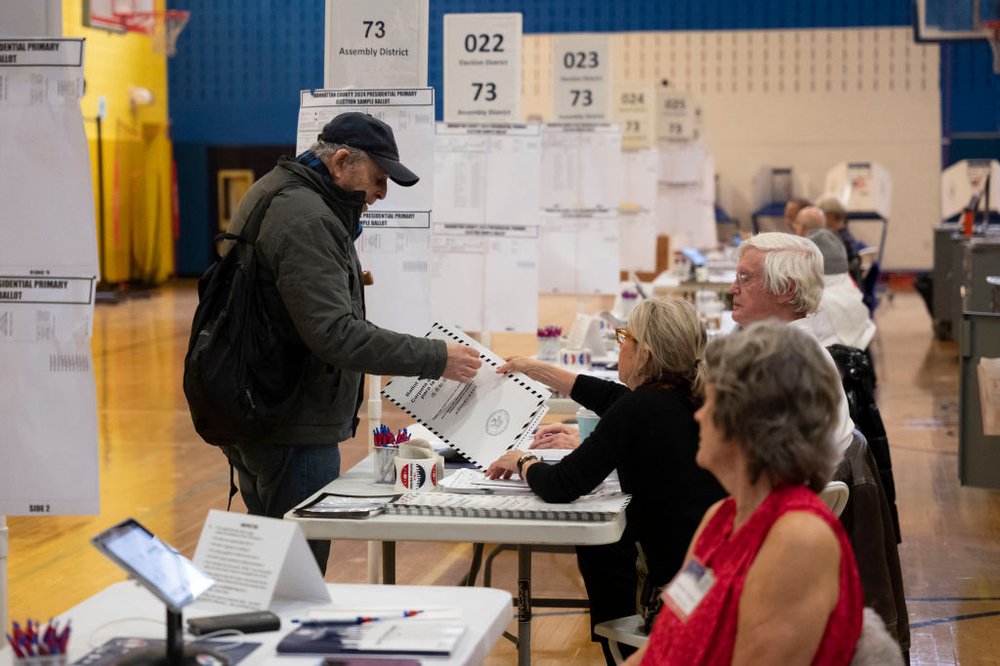What if NYC’s mayoral election was this year? Experts say more people would vote in it.
April 29, 2024, 6:01 a.m.
A proposed constitutional amendment could shift city elections from odd to even years.

While New York City voters must wait until next year for another mayoral election, some Albany lawmakers want to reset the date of future municipal elections to boost the city’s anemic voter turnout.
State Sen. James Skoufis, a Democratic representing parts of Orange County, is introducing a constitutional amendment this week that would shift all city elections from odd-numbered years to even-numbered ones, aligning them with state and federal elections that routinely see dramatically higher voter turnout.
“The constitutional amendment completes the job that we started last year,” Skoufis said, referring to legislation he cosponsored that moved county and town elections from odd- to even-year cycles. Gov. Kathy Hochul signed it into law last year.
The state constitution mandates that elections in cities take place during odd-numbered years, meaning a constitutional amendment is required to change that schedule. The process takes a minimum of two years and requires a ballot measure going before voters.
Interest in moving New York City’s municipal elections to even-numbered years has been gaining increased support across the ideological spectrum. Data shows voter turnout is at its lowest rate for a general election in more than a decade, with the exception of election years where only judicial candidates were on the ballot.
Only 12.8% of eligible voters in New York City voted in the 2023 general election, when all 51 members of the City Council, along with two statewide ballot questions, were on the ballot, according to the city's Campaign Finance Board.
That’s a sharp drop from 38.3% turnout in 2022, when voters cast ballots for statewide offices, including governor, and congressional seats. In 2020, nearly 62% of eligible New York City voters voted for the presidency and congressional and state legislative seats.
“New York City's democracy is really only as strong as the share of its city that participates in elections,” said Paul Ryan, executive director of the city's Campaign Finance Board.
For the second year in a row, the board made shifting city elections to even-numbered years one of two policy recommendations in its annual report.
While roughly 82% of eligible voters are registered to vote in New York City, the number of actual voters falls precipitously in city elections, according to the board. Younger voters and voters in communities of color experience even bigger drops in turnout.
Only 6% of registered voters ages 18 to 29 voted in last year’s election, with the lowest turnout rate in Community District 1 in the Bronx, which includes Melrose, Mott Haven and Port Morris, where 93% of the population is Latino and Black, according to an analysis by NYU’s Furman Center.
Skoufis' legislation to move county and town elections to even-number years faced opposition from several Republican lawmakers last year. A handful of Republican-led counties continue to oppose it.
Earlier this month, Nassau County Executive Bruce Blakeman and the county Legislature sued Hochul and the state, seeking to prevent the law from taking effect. A similar lawsuit was filed in Oneida and Onondaga counties in Central New York.
The Manhattan Institute, a right-leaning think tank, issued a report earlier this year that made the case for moving city elections to even years to align with state and federal contests. The institute cited the opportunity to decrease the “influence of special interests” by increasing voter turnout across the board.
The report also noted that consolidating elections could save taxpayers millions of dollars. In New York City, it costs the local Board of Elections approximately $30 million to administer each election.
The Manhattan Institute recently polled 700 likely voters in the city's 2025 mayoral election and found 61% supported moving city elections to even-number years. A poll from Siena College last June found 47% support among voters for moving elections to even-number years.
Citizens Union, a nonpartisan nonprofit that's been a leading proponent of shifting city elections, issued a detailed analysis in January 2023 that found turnout increased by up to 460% in cities that switched their elections to coincide with state and federal elections.
Ben Weinberg, director of public policy at Citizens Union/Citizens Union Foundation, said state lawmakers should take action on the constitutional amendment this legislative session.
“If you look at the recent city elections, voter turnout has dropped essentially every cycle,” he said. “If we want to stop the bleed this decade, we need to start working on this now.”
NYC youth voter turnout is always low. Can this digital tool change that? Why does NY even bother with a presidential primary now? It has to do with Andrew Yang. Meet NYC's new campaign finance watchdog, arriving amid probe into Mayor Adams' campaign